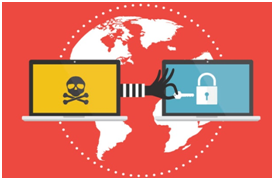

Context
With the evolving world, Cyber threat has become one of the most emergent issues which are now seen as ‘Grey Zones Operations‘ and creates a threat as it is weaponised by the countries.
|
Grey-zone Operations:
|
About
What is Cyber-security?
- Cyber securityis concerned with making cyberspace safe from threats, namely cyber-threats.
- The notion of “cyber-threats”implies the malicious use of information and communication technologies (ICT) either as a target or as a tool by a wide range of malevolent actors.

What does Weaponsiation of Cyberspace mean?
- Cyber weapon is usually sponsored or employed by a state or non-state actor, meets an objective that would otherwise require espionage or the use of force, and is employed against specific targets.
- A cyber weapon performs an action that would normally require a soldier or spy, and which would be considered either illegal or an act of war if performed directly by a human agent of the sponsor during peacetime.
- Legal issues includeviolating the privacy of the target and the sovereignty of its host nation. Examples of such actions are surveillance, data theft and electronic or physical destruction.
Challenges of Cyber Security:
|
Weapons used: Cybercriminals will use any internet-connected device as a weapon, a target or both, and SMBs tend to deploy less sophisticated cybersecurity measures. 1. Malware attack 2. Ransomware 3. Trojan 4. Password attack 5. Ransomware 6. DDoSetc. |
- Digital Data Threat: Growing online transactions generate bigger incentives for cybercriminals. Besides, establishments looking to mine data—for instance, customer information, results of product surveys, and generic market information—create treasured intellectual property that is in itself an attractive target.
- Supply Chain Inter-connection: The supply chains are increasingly interconnected. Companies are urging vendors and customers to join their networks. This makes a company’s security wall thin.
- Hacking: This action is penetrating into someone’s system in unauthorized fashion to steal or destroy data, which has grown hundred folds in the past few years. The availability of information online makes it easier for even non-technical people to perform hacking.
- State-sponsored cyber-attacks: They are typically difficult to track or defend against due to their lack of physical components. Their anonymity allows them to hide in systems undetected until their attack is unleashed. Many of these attacks exploit "zero days" (vulnerabilities in software that companies have zero days to fix).
Sectors those are vulnerable:
- The most targeted sectors: health care, education and research, communications and governments.
Few instances of using Cyberspace as a Weapon:
|
Arguments in favour |
Arguments against |
|
|
Possible Solutions:
- Defence of data-The emphasis should be on prioritising the defence of data above everything else. Consequently, law enforcement agencies would need to play a vital role in providing effective defence against cyber-attacks.
- Prioritise resilience-While solving the technical side is ‘one part of the solution, networks and data structures need at the same time to prioritise resilience through decentralised and dense networks, hybrid cloud structures, redundant applications and backup processes’.
- Building trust in systems-To prioritise building trust in systems whether it is an electrical grid, banks or the like, and creating backup plans including ‘strategic decisions about what should be online or digital and what needs to stay analog or physical, and building capacity within networks to survive’ even if one node is attacked.



